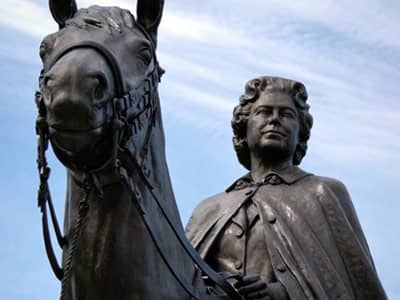
She loves thick marmalade over butter that melts into her toast, always with tea, and preferably with her corgis at her feet. He rises at dawn every day and exercises before settling down to a bowl of oats. She is the Queen of England, and he is Nelson Mandela, the man who led South Africa to democracy after fifty years of forced racial separation (apartheid). Two people who appear so different yet have similar lessons about the true nature of commitment, and forgiveness.
In June, the world will celebrate Queen Elizabeth’s 86th birthday and her 60 years on the throne in the United Kingdom. Then on July 18, it is the 94th birthday of Nelson Mandela. The United Nations has called on all to volunteer 67 minutes of community service on that day as a tribute to Mandela’s 67 years of public service.
Mandela was also born into royalty; his father was a chief of the AmaXhosa, Royal House of the Thembu. But unlike the large palaces that Queen Elizabeth calls home, Mandela grew up in a mud-and-wattle hut with his beloved mother, Fanny. She was his father’s fourth wife. Mandela’s birth name was Rohilalhla which means he who shakes the branches. A teacher at the mission school he attended gave him the name Nelson. The name was intended to honor the famous British naval admiral of the 18th century.
Photo Courtesy of South Africa Tourism
In many ways the lives of Queen Elizabeth and Nelson Mandela were very different yet there are important parallels. She was born into privilege, but during her time as Britain’s royal leader the country had survived scandals, recessions and the shrinking of the British Empire. She has often been criticized, sometimes cruelly, in books, movies, and newspaper columns.
Her dignity, quiet passion for serving the British people, and humility have made her stand out. You never hear her saying how special she is. Nelson Mandela shares those same qualities. They allow their actions to speak.
Mandela trained as a lawyer and became a leader of the African National Congress fighting for the right to dignity and respect for all of South Africa’s people – not just black people, all people. That is what made him remarkable; he was jailed for 26 years and when he was released from jail in 1991, he showed no bitterness. Just love. Former president Bill Clinton has become a close friend of Nelson Mandela. He says he once asked Mandela: "I watched you walk down that dirt road to freedom. Now, when you were walking down there, and you realized how long you had been in their prison, didn't you hate them [white people] then? Didn't you feel some hatred?"
“Mandela said, ‘Yes, I did a little bit.’ Then he said, ‘As I felt the anger rising up, I thought to myself, `They have already had you for 27 years. And if you keep hating them, they'll have you again.' And I said, `I want to be free. And so I let it go. I let it go.’”
I let it go. How many of us do that with our own resentments and anger? How many of us realize that when we hold onto hate we make the person who harmed us eternally powerful? The Queen had to learn to let it go too. Her husband’s uncle, and the favorite great-uncle of her son Charles, was The Earl of Mountbatten. He was on a quiet fishing trip in Ireland in 1979 when the Irish Republican Army blew him up. Neither the Queen, nor her husband, nor her son, have ever said anything against the Irish, and when the time came her government gave those who fought for greater independence from England, what they desired.
She did not always approve of her daughter-in-law, Princess Diana. But when Princess Diana was tragically killed in a car accident in Paris, the queen first saw to her grieving grandsons, and then she spoke to the British people acknowledging their love of Diana and her tragic death. She has shown deep respect to the memory of Diana, the mother of her grandsons.
The lessons of the Queen and Mandela are important because they teach us that life is made of many difficulties; we will probably get criticized, and we may even make dangerous enemies. But how we deal with those challenges determines how happy the rest of our life will be. And as Queen Elizabeth and Nelson Mandela show, life can be very long.
But life can also surprise us with great happiness just when we thought it was too late for that to happen: Nelson Mandela was 71 when he walked out of prison, 75 when he became the first president of a democratic South Africa, and 80 when he married Graca Machel. He now enjoys what he says is, “the greatest love and happiness” of his life. But if he’d held on to old resentments, his heart would not have been open to allow love in.
It’s never too late to let go. It is never too late to start again. We’ve all said about someone remarkable, like a Mandela, or someone who handles personal tragedy with grace: ‘I never could be that strong.” They never thought they could be that strong either, until they had to.
Charlene Smith is an award-winning journalist and an authorized biographer of Nelson Mandela. She lives and works in Cambridge, Massachusetts.


